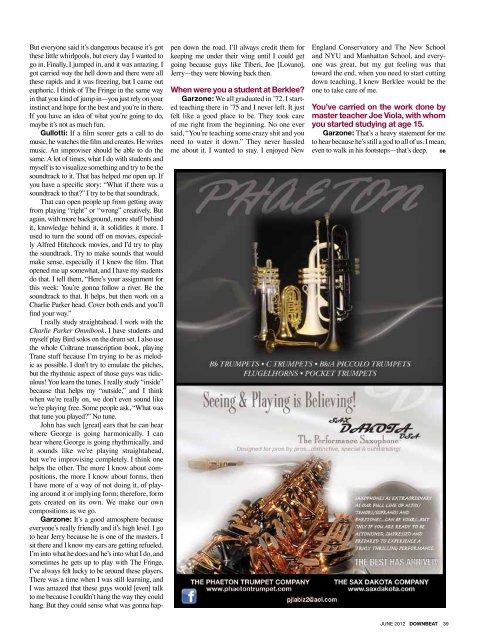Ralph Peterson 35th Annual Student Music Awards - Downbeat
Ralph Peterson 35th Annual Student Music Awards - Downbeat
Ralph Peterson 35th Annual Student Music Awards - Downbeat
You also want an ePaper? Increase the reach of your titles
YUMPU automatically turns print PDFs into web optimized ePapers that Google loves.
But everyone said it’s dangerous because it’s got<br />
these little whirlpools, but every day I wanted to<br />
go in. Finally, I jumped in, and it was amazing. I<br />
got carried way the hell down and there were all<br />
these rapids and it was freezing, but I came out<br />
euphoric. I think of The Fringe in the same way<br />
in that you kind of jump in—you just rely on your<br />
instinct and hope for the best and you’re in there.<br />
If you have an idea of what you’re going to do,<br />
maybe it’s not as much fun.<br />
gullotti: If a film scorer gets a call to do<br />
music, he watches the film and creates. He writes<br />
music. An improviser should be able to do the<br />
same. A lot of times, what I do with students and<br />
myself is to visualize something and try to be the<br />
soundtrack to it. That has helped me open up. If<br />
you have a specific story: “What if there was a<br />
soundtrack to that?” I try to be that soundtrack.<br />
That can open people up from getting away<br />
from playing “right” or “wrong” creatively. But<br />
again, with more background, more stuff behind<br />
it, knowledge behind it, it solidifies it more. I<br />
used to turn the sound off on movies, especially<br />
Alfred Hitchcock movies, and I’d try to play<br />
the soundtrack. Try to make sounds that would<br />
make sense, especially if I knew the film. That<br />
opened me up somewhat, and I have my students<br />
do that. I tell them, “Here’s your assignment for<br />
this week: You’re gonna follow a river. Be the<br />
soundtrack to that. It helps, but then work on a<br />
Charlie Parker head. Cover both ends and you’ll<br />
find your way.”<br />
I really study straightahead. I work with the<br />
Charlie Parker Omnibook. I have students and<br />
myself play Bird solos on the drum set. I also use<br />
the whole Coltrane transcription book, playing<br />
Trane stuff because I’m trying to be as melodic<br />
as possible. I don’t try to emulate the pitches,<br />
but the rhythmic aspect of those guys was ridiculous!<br />
You learn the tunes. I really study “inside”<br />
because that helps my “outside,” and I think<br />
when we’re really on, we don’t even sound like<br />
we’re playing free. Some people ask, “What was<br />
that tune you played?” No tune.<br />
John has such [great] ears that he can hear<br />
where George is going harmonically. I can<br />
hear where George is going rhythmically, and<br />
it sounds like we’re playing straightahead,<br />
but we’re improvising completely. I think one<br />
helps the other. The more I know about compositions,<br />
the more I know about forms, then<br />
I have more of a way of not doing it, of playing<br />
around it or implying form; therefore, form<br />
gets created on its own. We make our own<br />
compositions as we go.<br />
garzone: It’s a good atmosphere because<br />
everyone’s really friendly and it’s high level. I go<br />
to hear Jerry because he is one of the masters. I<br />
sit there and I know my ears are getting refueled.<br />
I’m into what he does and he’s into what I do, and<br />
sometimes he gets up to play with The Fringe.<br />
I’ve always felt lucky to be around these players.<br />
There was a time when I was still learning, and<br />
I was amazed that these guys would [even] talk<br />
to me because I couldn’t hang the way they could<br />
hang. But they could sense what was gonna hap-<br />
pen down the road. I’ll always credit them for<br />
keeping me under their wing until I could get<br />
going because guys like Tiberi, Joe [Lovano],<br />
Jerry—they were blowing back then.<br />
When were you a student at Berklee?<br />
garzone: We all graduated in ’72. I started<br />
teaching there in ’75 and I never left. It just<br />
felt like a good place to be. They took care<br />
of me right from the beginning. No one ever<br />
said, “You’re teaching some crazy shit and you<br />
need to water it down.” They never hassled<br />
me about it. I wanted to stay. I enjoyed New<br />
England Conservatory and The New School<br />
and NYU and Manhattan School, and everyone<br />
was great, but my gut feeling was that<br />
toward the end, when you need to start cutting<br />
down teaching, I knew Berklee would be the<br />
one to take care of me.<br />
You’ve carried on the work done by<br />
master teacher Joe Viola, with whom<br />
you started studying at age 15.<br />
garzone: That’s a heavy statement for me<br />
to hear because he’s still a god to all of us. I mean,<br />
even to walk in his footsteps—that’s deep. DB<br />
JUNE 2012 DoWNBEAt 39

















